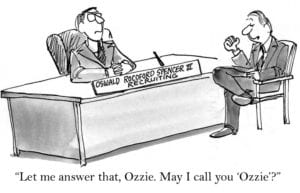You have prepared, you have role-played tough questions and you have practiced your elevator pitch. Yet you can still go to pieces in a nerve-wracking interview. What do you do when your important job interview is heading for the ditch?
Here are our top tips for when you get that sinking feeling – above all, remember, don’t panic.
Recognise the signs
Look out for the warning signs that things are not going to plan. For example, if the interviewer isn’t paying attention or is clearly ignoring your answers, you could be in trouble. However, some people are easily distracted (while others unfortunately are simply unprofessional) so don’t take it personally.
Similarly, if the interviewer displays negative body language, such as crossed arms or lack of eye contact, it might be a bad sign. A good job interview should, at some point, feel more like a conversation than a grilling or an abrupt Q&A session. If your interview is unexpectedly short or always feels like an interview with no break in the formalities, it might be because it’s not going as well as it could. But, it might simply mean that the interviewer feels awkward and even out of their depth.
Ironically, an interview that seems too easy isn’t always a good sign either. Particularly for senior positions, you should expect the interviewer to ask you some challenging, probing questions as well as pitching the benefits of the position to you.
It’s tricky – but not impossible – to recover from an interview that starts to go south. If it happens to you, don’t panic. Try one of these strategies to regain control.
1. Keep breathing
It’s natural to be nervous but many people end up either talking too fast and too much, or shutting down and mumbling. If you notice this, pause, take a deep breath and compose your thoughts. Don’t be afraid of silence.
2. Stay positive
This is challenging – but essential – when things are going wrong. It’s not impossible to turn around a bad start. If you’re late for example, give a simple, short apology. Something along the lines of: “I’m not typically late but I had an unexpected…” will work much better than a convoluted sob story.
Some interviewers can be quite intense. If you can demonstrate your resilience by staying upbeat under pressure, you could even turn it into a personal selling point.
3. Don’t be afraid to rephrase or explain your answers
If you get that ‘I should not have said that’ feeling, take a moment to clarify. You can do this even if the interviewer has moved on to the next question. But keep it simple. It’s perfectly ok to say something along the lines of: ‘If I may, I’d like to clarify something on that last question’.
4. Ask for further explanation
Don’t worry if you’re asked a question you don’t understand. Sometimes people inadvertently lapse into ‘company-speak’ forgetting that no-one else has a clue what they’re talking about. Simply ask politely if they can clarify what they meant. This has the added benefit of giving you time to think of a reply.
You don’t have to know everything. Asking for more precise information can sound analytical and professional. This is better than stumbling through a vague answer or trying to bluff your way and getting it completely wrong.
5. Be prepared to change tack
If you sense your answers are getting a less than warm response, you might be able to turn things around by talking about a different job, hobby or an aspect of your education. You could even try a short anecdote to try and break the ice. You should also strive to appear interested in the role and ask questions even if you’re starting to get a bad vibe.
6. If all else fails…
If you get to the end of the interview and are asked if you have any questions, it could be your opportunity to address any mistakes or mention details you forgot earlier. But again, keep it brief.
7. Use a thank-you note to clarify a point.
It might sound old-fashioned to some, but sending a thank you note after an interview does give a good impression. It is also an opportunity to reinforce your enthusiasm and address or clarify a point or idea you’d like to emphasise. Keep it short and professional. Thank the interviewers for their time, and briefly explain whatever it is you’d like to clarify.
Even if you don’t get the job, you will leave a much better impression if you stayed calm and professional throughout. Keep looking. It’s vital not to let your self-esteem spiral down; there are other opportunities out there.
You should also take some time to reflect on what went wrong. It may be that, despite all your best efforts and preparation, something outside your control happened. If it was lack of passion, maybe the job just wasn’t right for you. On the other hand, if you can identify a specific problem, you can fix it. If it was nerves causing you to forget things, then extra preparation and practice can really help.
Whatever happens, keep positive and keep your professional reputation intact. And, if you’d like some tips for your next interview take a look at this.

